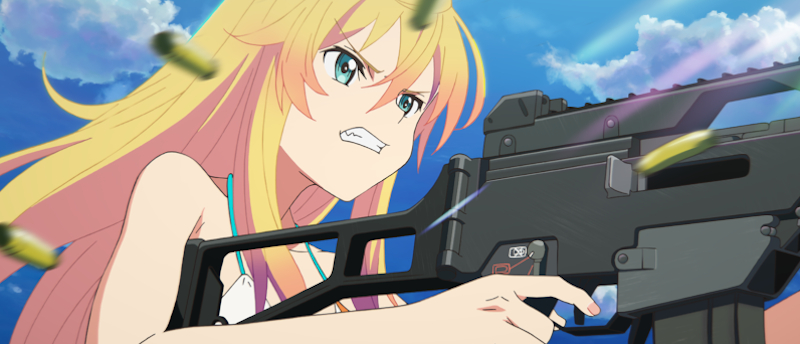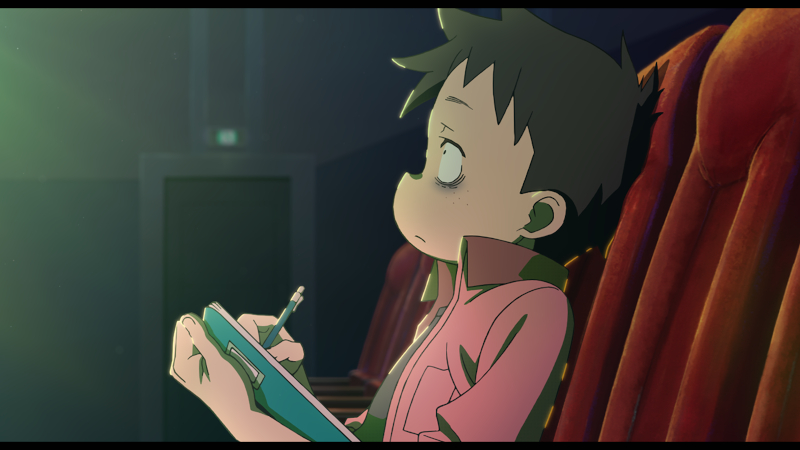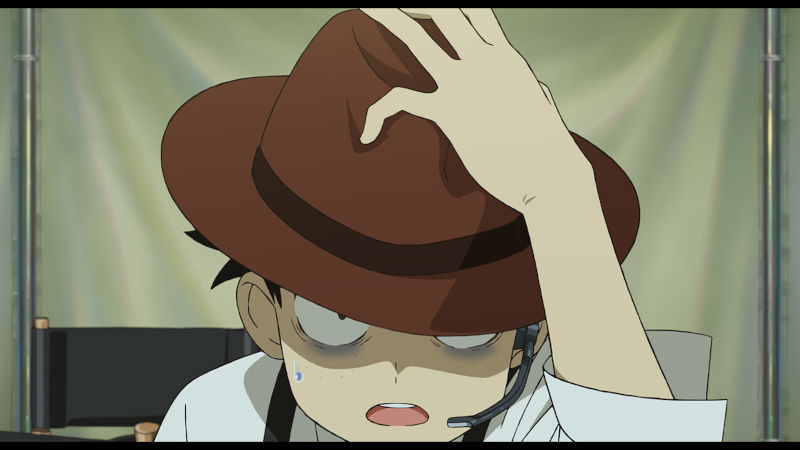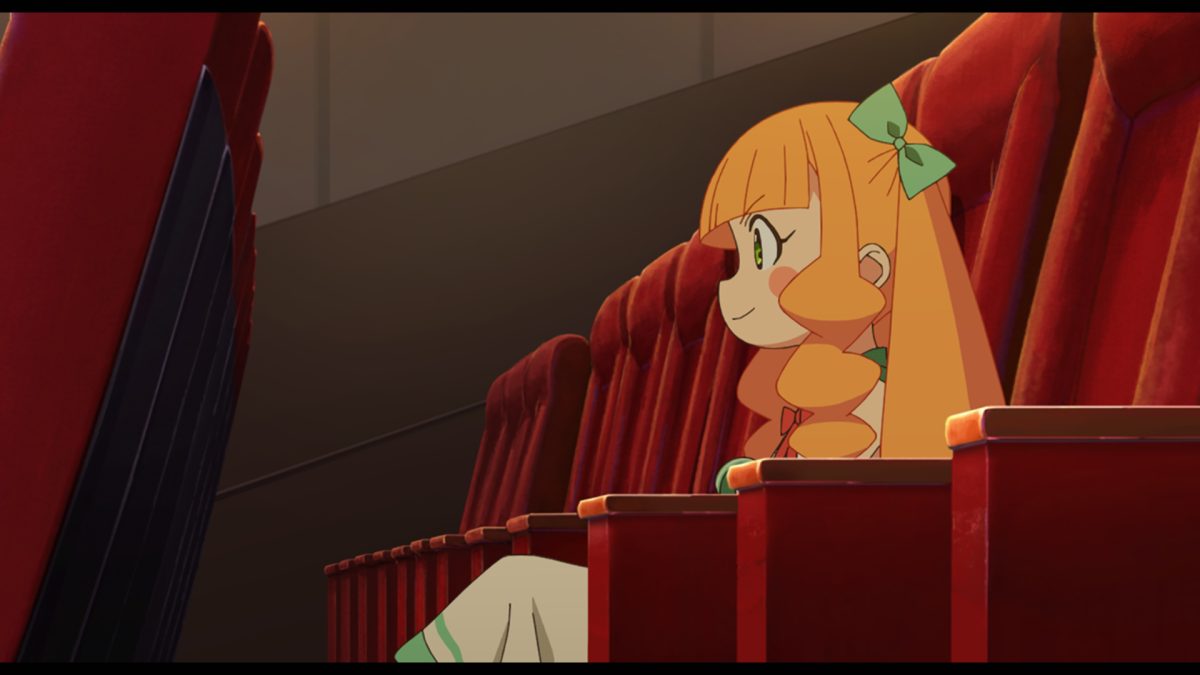Director – Takayuki Hirao – 2021 – Japan – Cert. 12a – 94m
*****
A film buff working as a movie producer’s assistant is unexpectedly given the job of directing his first feature film– out in cinemas on Wednesday, June 29th
Much in Pompo The Cinéphile riffs off Roger Corman’s legendary working methods. It takes place in a fictional Tinseltown named Nyallywood (what’s with the name? are they worried about getting sued?) and has near its centre the eponymous Pompo (voice: Konomi Kohara from Demon Slayer the Movie: Mugen Train, Haruo Sotozaki, 2020; Sword Art Online, series, 2012-) who looks like a sprightly young girl (and is exactly that in occasional flashbacks) but is, in fact, a seasoned, teenage (!) producer of exploitation movies (sample titles: Across The 8th Dimension, Guns Akimbo, Zombizarre) starring a busty blonde named Mystia (voice: Ai Kakuma) who is currently shooting a Summer movie titled Marine with lots of girls in revealing bikinis fleeing a giant tentacled beastie at the beach with which the gun-wielding Mystia will do battle: quite literally a ‘tits and tentacles’ show “with just the right amount of sex appeal.” Director Hirao is, after all, the man behind similarly exploitative anime Gyo: Tokyo Fish Attack! (2012).

When Pompo talks about trailers “with something blowing up at the end”, one immediately recalls Corman’s legendary penchant for anything goes in putting together a movie trailer as long as it contains an exploding helicopter, regardless of whether or not there is actually one in the film itself. She’s equally quotable, coming out with statements like, “if the actress is attractive, it’s a great film.”
The proceedings are bookended by a theatrical Nyallywood show in which a female MC performs a big razzmatazz number about “your dreams on fire”, but between the covers of this tale of the moving image factory, we meet Pompo’s timid and self-reproachful production assistant Gene Fini (voice: Hiroya Shimizu), a youth who we later learn she took on because life had beaten him down and he therefore had the experience necessary to develop a unique vision in the movies. Gene is a loner who, prior to this job, has spent his whole life hanging around in cinemas watching movies and writing incessantly about them and how they are put together in the little notebook he carries with him everywhere.

He is as surprised as we are when Pompo, who’s recently scolded him for arriving too late for the day’s work to sit in on a casting session, asks him to cut a 15-second trailer spot for Marine. He is terrified, but nevertheless goes into the editing facility and comes up with something both Pompo and her legendary producer grandfather thinks works. This leads to more trailer-cutting work and then an offer to direct Pompo’s self-penned script Meister. She has already cast the script with the world’s top actor (!) Martin Braddock (voice: Akio Otsuka from Porco Rosso, Hayao Miazaki, 1992, Ghost In The Shell, Mamoru Oshii, 1995; Memories, Koji Morimoto, Tensai Okamura, Katsuhiro Otomo, 1995; Final Fantasy: The Spirits Within, Hironobu Sakaguchi, Motonori Sakakibara, 2001; Tokyo Godfathers, Satoshi Kon, 2003) and an unknown contract player named Natalie who Gene had previously seen stepping in a puddle on his way to the Studio and visualised in a movie scenario.

From there it develops into a shoot in Switzerland and one of those movies about the process of moviemaking, focusing on the savvy producer whose utterances suggest she doesn’t know what she’s talking about but nevertheless always seems to get the job done, her legendary film maker grandfather, the hotshot actor who turns out to be generous with newcomers, the supportive actress whose been around the block a few times and the ingénue actress finding her way in her first starring role who graciously accepts her guidance.
In this sanitised version of the film industry, everyone works hard, looks out for everyone else and no backstabbing ever occurs. We’re certainly not talking Swimming With Sharks (George Huang, 1994) where the assistant suffers psychological abuse at the hands of his producer, this being nearer to the whimsy of Day For Night (François Truffaut, 1973) with its amazing cast of movie set characters, although Pompo only manages about half a dozen.

If it’s a rose-tinted view of movie production, it’s also a firmly modern one, foregrounding state of the art movie technology such as the digital edit suite but finding room to mention such pre-digital tools as a film cutter and curiously create digital editing imagery which employs lengths of old school, physical celluloid. Gene loves watching lengthy movies in a screening room, but grew up in cinemas unaware of the shadowy Pompo (with no idea who she was) who would always leave the moment the credits began to roll. His idea of a movie is Cinema Paradiso (Guiseppe Tornatore, 1988) whereas for her it’s far too long. Eventually, this rubs off on him: when asked what he likes most about the film he’s made, he says it’s the ninety minute running length.

A subplot involves Gene’s teenage acquaintance Alan who once pushed him in the rain but now realises Gene has what it takes to be a visionary film director. Alan works in an investment bank – and finding the work unfulfilling. On the verge of resigning, he jumps at the chance to get his company to back a reshoot, the bank branding itself as an organisation that supports people’s dreams.
Periodically, Japan’s animation industry comes up with something that seems to push the boundaries of what you can do in animation. This film is one of those. Had it been made in live action, it wouldn’t possess the qualities it does as animation, a medium in which, somehow, it works perfectly.
Pompo The Cinéphile is out in selected Odeon, Showcase, Picturehouse, Vue and more Cinemas in the UK in Japanese with English subtitles from Wednesday, June 29th, and with an English-language dub from Thursday, June 30th. More information and book tickets here.
Trailer (subtitled):
Trailer (dubbed):
